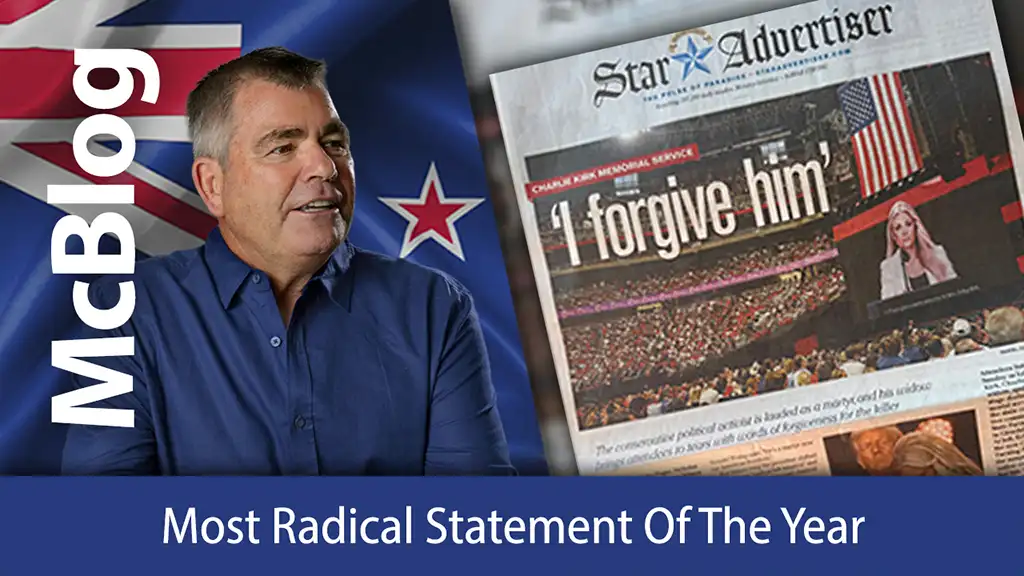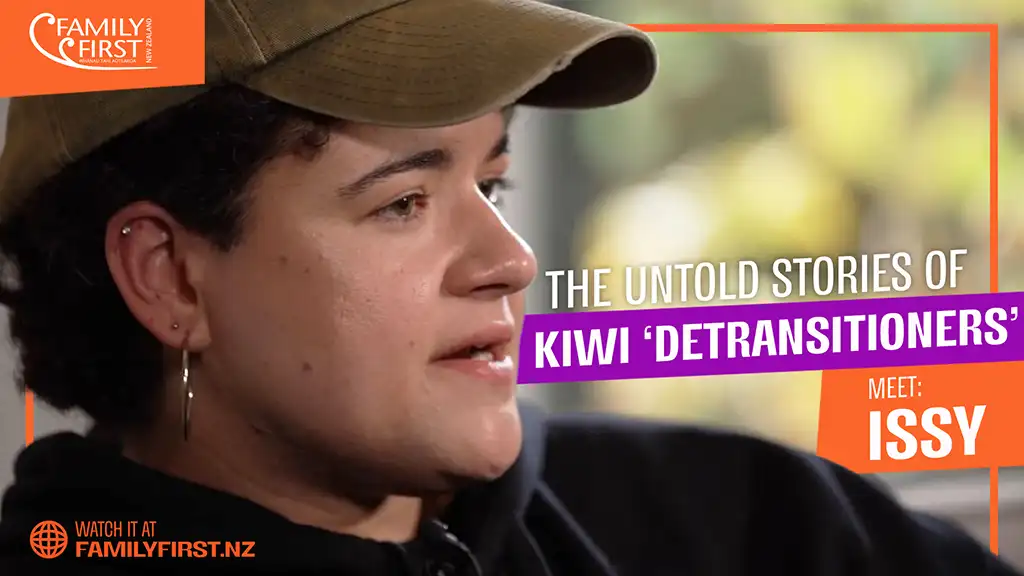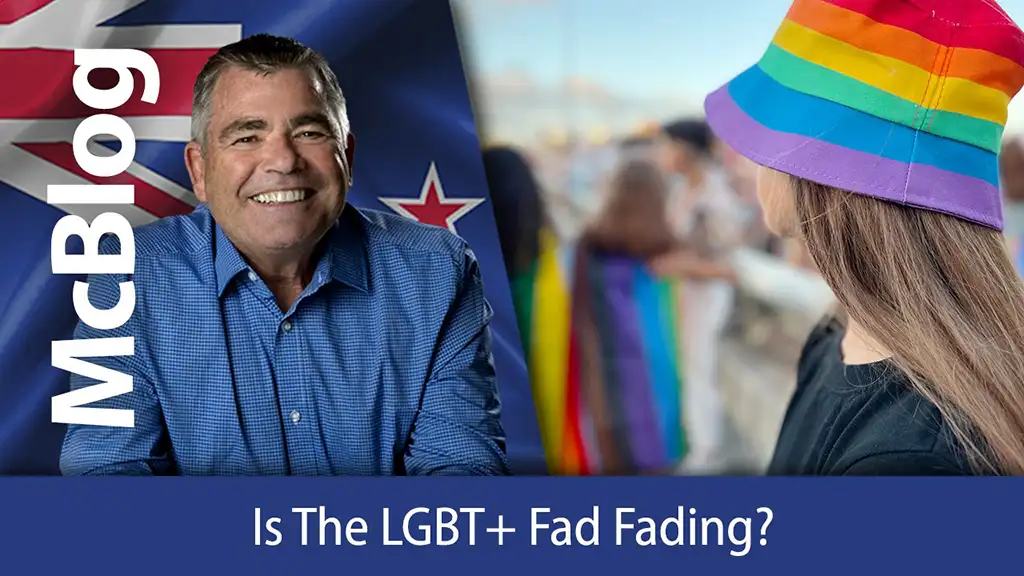Show script:
When I was 13, I started socially transitioning. By the time I was 15, I was on puberty blockers. When I was 16, I was on testosterone. I had top surgery lined up for when I was 18 years old. If I said I was suicidal, that would get me through the system quickly, so I, I did exactly what they told me to do.
MEET ZARA
When I was seven years old, I went through some trauma that led to me questioning what it meant to be a girl. I had a few moments in primary school where I was told that being a girl was less valuable. And I remember when I was 10, we were going on school camp and my teacher told me that I had to sleep in the girls’ cabin. I couldn’t sleep in the boys’ cabin with all my friends. I just had mostly friends who were boys. We played video games together, all the boyish things.
To be honest, I was just a tomboy, but the insecurities that came from the traumatic events when I was younger fuelled my willingness to look into transgenderism when I was older.
And then when I was in intermediate school, when I was 13, I found this thing on the internet called ‘transgender’. And I looked into it a little bit more, and it described this feeling of a disconnect between your gender and how you feel. That really resonated with me, in that I liked doing boys’ things, like, I liked playing sports. I liked being a bit rough with my friends, not so much the, the more feminine things that girls were supposed to do. So I figured that I must be transgender.
When I got to high school, I found a new group of friends who knew about being transgender and helped me through the process, and pushed me towards changing my name, cutting my hair short.
I didn’t have a lot of friends from intermediate and primary going to the same high school as me, which meant that I pretty much had a fresh start and it was very easy to me, very easy for me to do a clean slate transition.
So I’d been seeing a counsellor for a couple of years. She described what it meant to be transgender and what it meant to be gay, and all of the, all of the letters.
I was wearing boys’ clothes. I was going by a different name until I decided to take that further and I took that down the medical route.
TRANSITION
My counsellor at school said that it was worth talking to my GP and getting a full medical opinion, and then my GP referred me to a psychologist. I started seeing a psychologist when I was 14. My psychologist taught me about the medical side of being transgender. My psychologist specialised in gender dysphoria.
The Counseller told me that the time you’re on the waiting list for is significantly sped up if they think that there is a danger to your life, or if they think that you’re going to kill yourself.
Well, I was specifically told that that would get me through the system. If I said I was suicidal, that would get me through the system quickly, so I, I did exactly what they told me to do.
After about six months of seeing a psychologist, I was referred to a doctor. The doctor told me if I were to go on puberty blockers, I would experience some symptoms of menopause. Nothing permanent. It was all reversible, is what they told me.
The specialist doctor at the District Health Board did warn me about possible fertility issues, but they said that there’s not enough research to know.
So when I was at the age of 14, they offered me the possibility of doing IVF or getting my eggs removed and then frozen, which I, I look back now and I think that was a little bit much of a decision for me to be making. I found it quite stressful to be considering IVF as a 14-year-old.
I was worried about losing my fertility. I wanted to have children. But I also wanted to be a boy.
So by the time I was 15, I was on puberty blockers. That was mostly to stop my menstrual cycle. I was on puberty blockers from when I was 15, and I was on those for a year, and then it was my decision to take testosterone when I was 16.
The side effects of puberty blockers for me were, uh, I would get hot flashes, um, feeling quite unwell a lot of the time. It stopped my menstrual cycle.
Mentally I think I was really quite sad. Lacking in hormones definitely clouded my decision making.
The doctors told me when I was going on puberty blockers, it was to help me make a decision. It was to give me time to make a decision as to what I wanted to do.
At the time, I believed it was just a pause, and it was in a way nice to be able to just, to be frank, not have a menstrual cycle for a while. But all girls don’t like their menstrual cycle.
And then I was on testosterone for two years. My voice dropped after about six months on testosterone. I developed facial hair. I gained muscle really quickly, and I smelled different. I was more sweaty when I was on testosterone. I smelled more like a man.
I found that on testosterone, my ability to compartmentalise, it was just easy. I felt like I was thinking in straight lines on testosterone and then thinking in squiggly lines going back.
I changed emotionally as well. I found it very difficult to cry and that when I was angry, I was very angry. Angry, like nothing before. I couldn’t cry when I was sad, but when I was sad, it was a, it was like, it was, it was deep. It was a depression that was really hard to get out of.
I was definitely still depressed and quite anxious, but the further I got along, the more depressed I got and the more numb I was. So it was like I couldn’t be anxious because I was too numb to be anxious.
I would say that being on testosterone lessened my sex drive, but that came with being numb.
I had decided to change my name at school on the role when I was 14, and the teachers were sent out a global message. All of my teachers – and they were sent this for the rest of high school – that if they had even mentioned my birth name or they didn’t call me by my chosen name, then there would be serious action taken for them. Same with pronouns.
I only found out about that after high school, at least. They were being instructed to, and that they didn’t have a choice and that they weren’t allowed to ask questions. They weren’t allowed to bring it to me or ask questions about it. I had plenty of lovely teachers who just didn’t really see a problem with it and plenty of teachers who I know weren’t necessarily agreeing with it. There were some teachers I had who actually did struggle to call me a man because I didn’t look like a man or, like, describe me as such because I didn’t look like one and I’m not one.
The doctor brought up top surgery to me when I was 15 and it was just, it was said from then that I was gonna do it. The doctor told me that I couldn’t have ‘top surgery’ until I was 18, but they could give me an appointment with a psychologist, So as soon as I turned 18, I could get straight on the waiting list.
So I had an appointment with a psychologist that I’d never met before. It was less than an hour, asked me all the questions to tick boxes and asked me if I understood that it was a permanent decision, and that was it. And then I was on the waiting list as soon as I turned 18.
And then they brought it up again once I was 17 and said, do you still wanna do this? And I said, I said yes, I would do it. And that was it.
It was less than an hour with the psychologist I never met, one meeting with the surgeon and then off to surgery.
I think having boobs is a bit annoying, but again, as I found out only, I only found this out from de-transitioning, that actually a lot of women weren’t super keen to have breasts, especially during puberty.
The doctor and I discussed ‘bottom surgery’, but it was said that we would wait until after I had ‘top surgery’ to talk about it again.
The doctor had told me that getting a mastectomy was the same as getting breasts with cancer removed. When she told me that, that was probably the first time I really had a red flag of what she was saying.
I had little moments of, I’m not quite sure what she’s saying, or I’m not quite sure what the doctor means by this. But that was the first time when she told me that it was the equivalent of getting a cancerous organ removed, I just knew that she was wrong. She was simply wrong.
TELLING MY PARENTS
I was 13 when I told my dad, I think I’m transgender. I’ve always tried to be very open with my parents. I think that’s important. So I had my parents come with me to as many appointments as I as I could.
When the appointments first started, my parents came in for the first few. But after we had introduced ourselves and gone through the general admin chat, my parents would be sent into a different room to talk to a nurse so that I could talk to the doctor separately, and so she could ask me questions.
As time went on, the appointments were just me.
I definitely got the message that you don’t need your family if they cause you distress. And that if they don’t say yes to everything, then you don’t need your family.
When I had conversations with my parents about this, they always started and ended with the fact that it was more important that I had a good relationship with God, and that being transgender wasn’t my only personality trait.
So I always felt supported in the way that I’m a person and not a problem, but I knew that they disagreed with what I was doing.
I legally changed my name when I was 18. I had the opportunity to change my gender marker at the same time as to what I would be seen as on my records, and I chose not to change it mostly because of health reasons. Like, say I got in a car crash, and then there would end up being a whole lot of extra confusion if I’d put in different things, you know, that kind of stuff.
But I think the actual reason I didn’t change it, the reason behind the reason, was I knew that it wasn’t true. As much as I didn’t want to admit it with my actions, I knew that it wasn’t true.
DE-TRANSITION
I had found this book called Systematic Theology and I left it on my desk and it was open on a page for maybe two months, and that page said, “man as male and female”, and I had read that over and over again and then read the links to the Bible on that.
I started getting this feeling that something wasn’t right, like God had a bigger plan for me and that I couldn’t, I felt like I wasn’t strong enough to do what God wanted me to do.
I’d been praying to God and I said, I need, I need help. And it was, it was that moment that night where I decided to detransition.
I had my final appointment with the surgeon before I went and actually got surgery, when it occurred to me that my soul felt like it was being ripped into.
I went up to my parents one day and I said “I don’t want to get top surgery anymore. You don’t need to take me to my appointment.” That was, I think that was quite a surprise for them.
It was like I was free, but I was angry, and I was excited, and I was nervous, and I was sad to lose what I’d worked for, cause it felt like I’d worked for it, you know.
I’d worked all my plans to get through the health system and then to get exactly what I wanted. I was sad to lose that, but I felt free.
On that night, any symptom I had of gender dysphoria or any thinking pattern that I had that replicated what they called gender dysphoria was gone.
After I had decided not to go through with top surgery, I went and saw my GP to discuss what it meant to stop hormone therapy to, um, go back on everything. And she said to go back to the doctor I had already been seeing about transgender healthcare.
I went back and saw her and explained to her what I’d been feeling and what had been going on and what I had decided to do.
She was very confused, and keeping in mind, I’d only seen her a month before and was about to go straight for surgery.
And I remember getting my letter, and opening it up and seeing that it was, here’s your ‘top surgery’ appointment. That was like a stirring in my spirit.
The doctor was shocked that I was de-transitioning or that I’d decided to do that. She first asked me if that was my own decision, and if I had made that decision on my own accord, and went through the list of – did your parents tell you to make this decision? Did your friends, or do you have any partners who decided that this is a good thing for you?
And then asked me about the church, if the church was telling me to do this?
And I told her, no, it’s all my own decision, and she was still very confused.
By that appointment where I told her that I was det transitioning, it was quite clear that I was taking up system resources, and that they didn’t want me there for longer than I needed to be.
I’ve been asked more questions in that one appointment where I said I was de-transitioning, than my whole two years of transitioning appointments.
I do also remember she gave me the de-transition statistic saying that 1% of people de-transition, and she’s never had a de-transitioner to come back to her.
I wish that she had questioned me more, and I wish she had asked more about why I’m transitioning. It was always, how do we get to the destination you want, rather than, why do you want that?
I think if you make your money making young women think that it’s okay to run away from being a woman, that makes me more sad than angry.
The first year of de-transitioning was hard. That was physically exhausting. It was going through puberty for the third time. Felt like being 14 again at the age of 20.
I de-transitioned at 18 years old. And now I’m 20. I’ve been de-transitioning for two years. It was difficult, but now after having de-transitioned for a couple years, I feel more at peace with who I am as a woman, and I can think more clearly in the way that my brain was designed to think and my body functions in the way it was supposed to, and I generally feel more free. I feel free.
I think de-transitioning is an important story to be told.
I wish that there were more de-transition stories when I was looking at what it means to be transgender.
I wish I could have seen the other side of the story.
And I think it’s important for young women to know you are just as powerful being a woman, and you’re much more powerful being who you are, and God made you exactly how you’re supposed to be.



